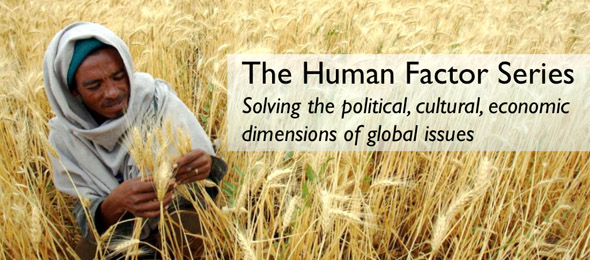SOCIAL INNOVATION
Sampler of MIT Research
on Justice, Economic Equity, Inclusion, Civil and Human Rights

HISTORY
Ebony and Ivy | Craig Steven Wilder
In his acclaimed book, Ebony and Ivy, MIT Professor of History Craig Wilder documents the breadth of the economic, social and intellectual entanglements between America’s early universities and the Atlantic economy that was rooted in the slave trade.
Story at MIT News
PHILOSOPHY | ON RACE AND GENDER
Q&A with MIT philosopher Sally Haslanger
A professor of philosophy and director of Women's and Gender Studies at MIT, Sally Haslanger discusses her book, Resisting Reality: Social Construction and Social Critique, a collection of essays on gender and race. “Both race and gender are social positions that individuals occupy by virtue of their body being interpreted a certain way.”
Interview by SHASS Communications
POLITICAL SCIENCE | RESTORATIVE JUSTICE
Taking full account of the past | Melissa Nobles
With research that illuminates historic episodes of racial and ethnic injustice, political scientist Melissa Nobles has developed a deep understanding of how different nations go about the process of self-examination and attempt to right the wrongs of the past.
Excerpt on MIT News | Full Story at MIT Political Science
ECONOMICS | CREATING OPPORTUNITY, REDUCING POVERTY
Abdul Latif Jameel Poverty Action Lab (JPAL)
JPAL's mission is to reduce global poverty by ensuring that policy is informed by scientific evidence. The lab is transforming the approaches to poverty alleviation, working to solve the complex challenge through the following seven research sectors: Agriculture, Crime, Education, Environment and Energy, Finance, Health, and Labor Markets.
JPAL Website
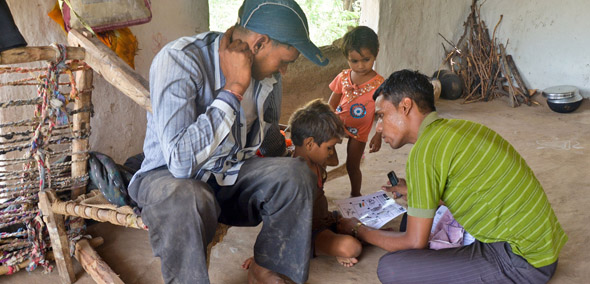
Photograph: Abdul Latif Jameel Poverty Action Lab, website
“J-PAL fits in perfectly with MIT’s mission and values — to make the world a better place through service to humanity. Everyone here is concerned with questions of deep moral importance — and that is how to relieve human poverty and the suffering it creates.”
— L. Rafael Reif, President of MIT
ECONOMICS | THE IMPACT OF INCOME INEQUALITY
Income inequality is costing the U.S. on social issues | Heidi Williams
This New York Times article on the possible public health ramifications of rising inequality cites research by MIT economist Heidi Williams that finds a connection between infant mortality and “excess inequality.”
Article at The New York Times
LITERATURE | DIVERSITY
MIT student podcast wins ASEE diversity contest
A podcast by recent graduate Shante Stowell ’15 has won a national contest sponsored by the American Society for Engineering Education (ASEE). The contest, part of ASEE's Year of Action on Diversity, solicited videos and essays from engineering students sharing a story related to any type of diversity.
Story at MIT News
MIT UNDERGRADUATES
LGBTQ students indeed welcome here, says survey
Living Pink survey results useful for wide range of students. Living Pink revealed predominantly positive sentiments in MIT’s undergraduate residences toward LGBTQ students. Now, survey co-creator Cory Hernandez (Political Science '14) is using those results to guide and encourage incoming students, influence living group policy and educate the MIT community.
Story at MIT News
HISTORY + POLITICAL SCIENCE
Innovations for social justice
With U.S. history and constitutional law on his mind, senior Cory Hernandez '14 envisions a society that welcomes all — starting with MIT. While the courtroom may one day be Hernandez’s venue for work toward a fair society, for now he focuses on MIT, where he has spearheaded numerous campaigns, student groups, and events to create a more welcoming and vibrant community.
Story at MIT News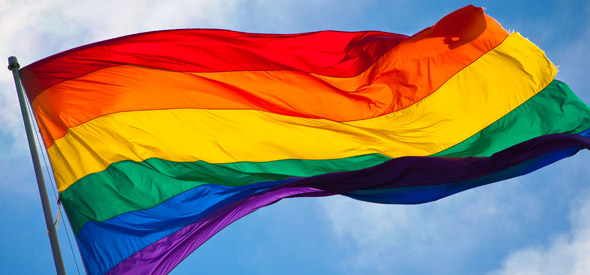
MIT Diversity, Equity, and Inclusion
Advancing a respectful, caring community that embraces diversity and empowers everyone to learn and do their best at MIT
Website
From the MIT Libraries
Book and film recommendations for Pride Month
Music and Social Justice Lib Guide
COMPARATIVE MEDIA STUDIES | WRITING
The hidden history of Bengali Harlem | Vivek Bald
MIT professor’s new book details the waves of South Asian immigrants to the United States. “I wanted to make clear the depth and the persistence of the South Asian presence in the U.S.,” Bald says, “and specifically the South Asian Muslim presence in the U.S., at a time when Muslims are being portrayed as newcomers, enemies and outsiders.”
Story
PHILOSOPHY
On Sexism and Gender Bias | Sally Haslanger
Haslanger, the Ford Professor of Philosophy at MIT writes: "As long as 'being presidential' and 'looking presidential' are about being and looking masculine, we will be unable to address what is ripping us apart as a country. Arguably, the androcentrism of our political system eclipses Clinton’s hard-won accomplishments and her vision of America’s strengths, and places undue weight on Trump’s particular form of masculinity. This form of sexism is dangerous for the well-being of our republic."
Commentary
HISTORY | SOCIAL EQUITY AND INNOVATION
The link between social equity and innovation | Anne McCants
Economic history tells us that innovation and population size/density are highly correlated... in populations where lots of people are both permitted and capable of 'having a go.'" Two conditions are critical: 1) being accorded the social dignity to speak their minds and pursue their own goals; and 2) access to the human capital that allows them to achieve their full potential. Both of these factors are severely limited by rigid systems of hierarchy and by the conditions of poverty.
Interview in The Human Factor series
POLITICAL SCIENCE | SOCIAL EQUITY AND HEALTH CARE
Focus on disparities to solve healthcare issues | Andrea Campbell
"Any initiative to address health and health-care goals must wrestle with and address the enormous disparities that exist in health coverage, access, and outcomes across racial and income groups in the United States. It’s as if poor or black Americans are living in a different country, and in terms of poverty, health insurance, and health-care access, effectively they are. This is a political and social problem as much as a technical one."
Interview in The Human Factor series
ECONOMICS | DIVERSITY IS EFFICIENT
Workplace diversity can help the bottom line | Sara Ellison
MIT economist scrutinizes firm data suggesting diverse offices function more effectively.
Story at MIT News
POLITICAL SCIENCE
On Racial Bias | Ariel White
"There's evidence that government is less responsive to people of color... that election officials are less likely to respond to informational questions about voting eligibility when they're sent from Hispanic-sounding names than when they're sent by non-Hispanic white names. These officials didn't respond rudely to Hispanic questioners; they simply didn't write back as often and didn't answer their questions as well."
Commentary
MIT and the Legacy of Slavery
Ongoing undergraduate research class and community dialogues
Webpage
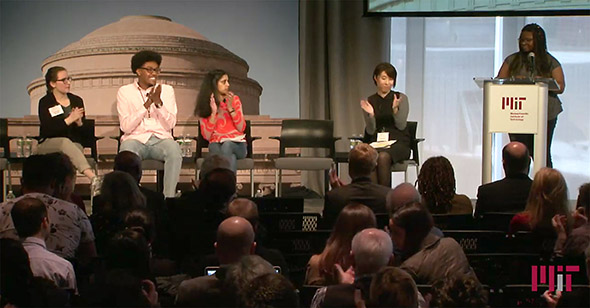
“I believe the work of this class is important to the present — and to the future. What can history teach us now, as we work to invent the future? How can we make sure that the technologies we invent will contribute to making a better world for all?"
— L. Rafael Reif, President of MIT
MIT and Legacy of Slavery webpage
About
Project catalyzed by President Reif. The first class of the "MIT and Slavery" (21H.S01) undergraduate research project took place in the Fall of 2017. Set in motion by MIT President L. Rafael Reif with SHASS Dean Melissa Nobles, the course was developed and taught by Craig Steven Wilder, the Barton L. Weller Professor of History, and the nation’s leading expert on the links between universities and slavery, in collaboration with Nora Murphy, the MIT Archivist for Researcher Services.
Letter from MIT President L. Rafael Reif
Initial findings. The initial class findings include, among others: insights about the MIT's role in the post-Civil War era of Reconstruction; examples of racism in the culture of the early campus; and the fact that MIT’s founder, William Barton Rogers, owned six enslaved people in Virginia, before he moved to Massachusetts in 1853. Findings will be published in detail on the project website in Spring 2018.
Story | Website | Video
New lines of research.The findings also suggest new lines of research. In a focus on these areas, MIT seeks to contribute to the larger national conversation about the legacies of slavery, and to lead research on the relationship between the slave economies of the Atlantic world, the fields of science and engineering, and U.S. technical institutions. As part of this effort, Professor Wilder is organizing a consortium of U.S technical and science institutions to explore such research in collaboration.
Community dialogues. As the "MIT and Slavery" research class continues, MIT has also launched a Community Dialogue series "to explore together how to address these new dimensions of our past" and to tell a more complete version of MIT history. This project, MIT and the Legacy of Slavery, is led by Melissa Nobles, Dean of the School of Humanities, Arts, and Social Sciences. The first dialogue event, The Early Findings, was held Feburary 16, 2018, and the second, The Task of History, takes place on May 3, 2018.
Story: The Initial Findings | Story: The Task of History
3 Questions with Dean Melissa Nobles and Professor Craig Steven Wilder
A community dialogue series is underway as multi-year research continues. The dialogues are an opening chapter in MIT's commitment to researching this history and making it public. A series of events will create campus-wide and community-wide opportunities for shared discussions of the findings and our responses. The first event in this process was held in February, and the second, The Task of History, took place on May 3, 2018.
Interview by SHASS Communications
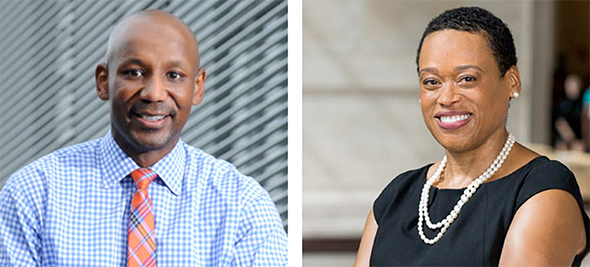
Craig Steven Wilder, Barton L. Weller Professor of History; Melissa Nobles, Professor of Political Science and Kenan Sahin Dean, MIT School of Humanities, Arts, and Social Sciences
WRITING
Ta-Nehisi Coates dazzles during two years at MIT
“What I tell my students is that you here at MIT have access to great knowledge—more knowledge than 99.9 percent of people who have ever been on planet Earth, and I think you have some sort of moral duty to learn how to communicate that. Knowledge is power; power shouldn’t be hoarded."
Story by SHASS Communications
ECONOMICS | SCHOOL EFFECTIVENESS AND INEQUALITY INITIATIVE
Studying school quality, to fight inequality
Education has long been perceived as a great leveler in the United States, providing opportunities throughout society. But at a time of economic struggle, millions of people are now wondering if the country’s schools can still provide a platform for success. In response, economists Joshua Angrist, Parag Pathak, and David Autor founded SEII, a home to diverse studies of education, school models, education policy, and their lifelong effect on Americans.
Story
PHILOSOPHY | INCLUSION IN THE FIELD
Philosophy in an inclusive key
Three philosophy graduate students in MIT’s School of Humanities, Arts, and Social Sciences have rolled up their sleeves to tackle the problem of diversity in philosophy programs.
Story by SHASS Communications
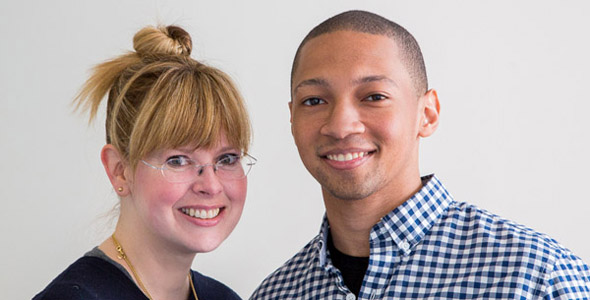
MIT Philosophy graduate students Abby Jacques and Kevin Richardson
"One thing that makes MIT different: It’s not at all an absurd thing for us to think, ‘There’s a problem here; let’s do something about it.'"
— Kevin Richardson
PCOMPARATIVE MEDIA STUDIES
By any media necessary | Sasha Costanza-Chock
In his book, Out of the Shadows, into the Streets! Transmedia Organizing and the Immigrant Rights Movement, Sasha Costanza-Chock, assistant professor in MIT’s program in Comparative Media Studies/Writing, enters into the debate of recent years about the role of new social-media platforms in abetting social and political change.
Story at MIT News
ANTHROPOLOGY
MIT Anthropology students assist with UN human rights review | James Howe
The United Nations will be evaluating the human rights record of Panama this April with a little help from MIT Professor James Howe and the graduate students in his new course, “Monitoring the Rights of Native Peoples.” Howe and his students are feverishly working to produce a five-page report for the Universal Periodic Review (UPR), the United Nations’ process for reviewing human rights practices around the world.
Story by SHASS Communications
POLITICAL SCIENCE | CIVIC ENGAGEMENT
MIT GOV/LAB researches new ways to empower citizens | Lily Tsai
Founder of MIT Governance Lab creates immersive opportunities for MIT students to research new forms of civic engagement around the world.
More

L to R: Ta Nehisi Coates, author, MIT MLK Visiting Scholar 2012-2014, recipient of the National Book Award, 2015; Lily Tsai, Associate Professor of Political Science; Sally Haslanger, Ford Professor of Philosophy
INTERNATIONAL STUDIES | NEW CITIZENS AND IMMIGRATION
Dream Chasers | John Tirman
What fuels America's immigration debate? Executive director of MIT’s Center for International Studies, John Tirman, explores that question in his 2015 book, Dream Chasers. “The way the reaction to illegal immigration has manifested indicates most clearly that the resistance is mainly one of cultural difference and exclusion … rather than economics or politics,” Tirman says.
Story at MIT News
LITERATURE
Intellectual property | Sandy Alexandre
Alexandre, a professor of literature at MIT, examines the relationship black Americans have with material possessions — the subject of a new book she is writing.
Story at MIT News
LITERATURE
Using literature to understand violence against African Americans | Sandy Alexandre
The grim history of lynching in the United States may be over, but it has been preserved through photographs, memoirs, novels, and poetry. Sandy Alexandre, associate professor of literature at MIT, studies those images and words to make reveal how closely lynching was related to the issue of property, in the form of bodies, possessions, and land.
Story at MIT News
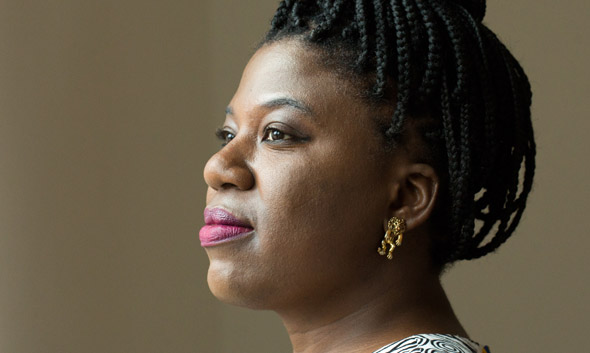
“What I love most about literature is that it facilitates empathy for, and acceptance of, other people. It’s a space of virtual intimacy between human beings that creates the circumstances to enable actual intimacy in the real world."
— Sandy Alexandre, Professor of Literature at MIT
POLITICAL SCIENCE
Regina Bateson: Crime, punishment and politics
MIT political scientist Bateson studies the long-term effects of war on people’s social and political behavior.
Story at MIT News
POLITICAL SCIENCE | ADVANCING JUSTICE
3 Questions | Melissa Nobles on advancing racial and restorative justice
Melissa Nobles, Professor of Poltiical Science, and Dean of MIT-SHASS, researches historical injustices in democracies. In this interview, she reflect on what her research suggests about the current efforts to advance civil rights in America.
Interview with SHASS Communications
POLITICAL SCIENCE
3 Questions: Melissa Nobles on the U.S. Census
As America’s decennial headcount gets under way, MIT political scientist Melissa Nobles discusses the history of race and ethnicity in the US Census.
Story at MIT News

L to R: Melissa Nobles, Professor of Political Science, and Dean, MIT School of Humanities, Arts, and Social Sciences; Craig Steven Wilder, Professor of History; David Autor, Professor of Economics
POLITICAL SCIENCE
On the Legacy of Segregation | Melissa Nobles, Tracey Meares
Police shootings and the Black Lives Matter campaign are illuminating the differences that white Americans and Americans of color experience in their everyday lives. Melissa Nobles, Kenin Sahin Dean of SHASS and Professor of Political Science, speaks with Yale Professor of Law Tracey Meares about the historical and structural forces at work. Moderated by Professor Seth Mnookin, Director of the MIT Graduate Program in Science Writing.
Video + Summary
HISTORY
Historian Craig Wilder featured in new Ken Burns film
Professor Craig Wilder served as a consultant on a recent Ken Burns documentary, "The Central Park Five." Wilder also appears in the film, providing historical perspective on the shocking events that began on April 19, 1989, in New York's Central Park.
Story by SHASS Communications
HISTORY
Uncovering the truth about racism on campus | Craig Wilder
Understanding the current US campus protests over racial injustice requires looking back centuries, explains MIT historian Craig Steven Wilder, whose 2013 book, Ebony and Ivy, explores the historical relationship of American universities to the Atlantic slave trade. In this interview, Wilder discuses how that history informs the Black Lives Matter movement.
Interview at Mother Jones | About Ebony and Ivy | Reviews: New York Times | WSJ
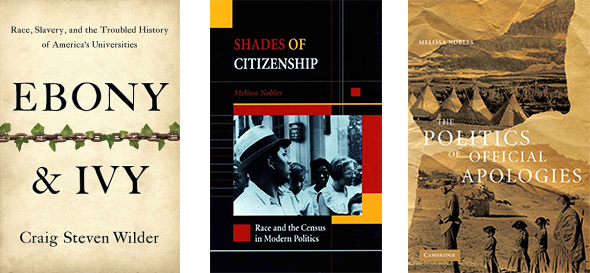
L to R: Ebony and Ivy: Race, Slavery, and the Troubled History of America's Universities, Craig Steven Wilder (Bloomsbury Press, 2013); Shades of Citizenship: Race and the Census in Modern Politics, Melissa Nobles (Stanford University Press, 2000); The Politics of Official Apologies, Melissa Nobles (Cambridge University Press, 2008)
POLITICAL SCIENCE
Re-thinking ethnic favoritism in politics
Study shows ethnic-based distribution of goods in African politics is not continuous, but instead intermittent and limited in scope.
Story at MIT News
POLITICAL SCIENCE AND URBAN PLANNING
If the people will lead
At an MIT panel on the future of black politics, scholars discuss the need for civic engagement at a time of economic stress.
Story at MIT News
LINGUISTICS | TRANSFORMING EDUCATION IN HAITI
Q&A: Michel DeGraff on teaching STEM in Kreyòl
MIT Associate Professor of Linguistics Michel DeGraff recently received a $1 million grant from the National Science Foundation for his linguistics research in Haiti, which includes developing classroom tools to teach science and math in Haitian Creole (Kreyòl) for the first time.
Story at MIT News
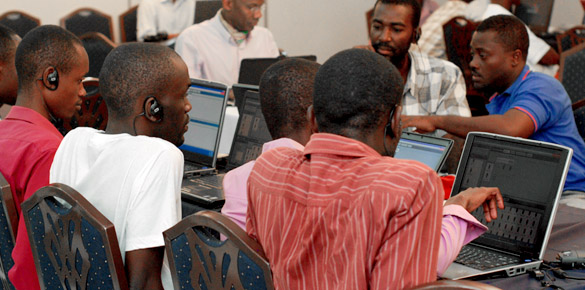
Workshop with Haitian professors of physics and biology
"We are helping create a new lexicon and new tools for science in Kreyòl— and a new culture for deep learning in Haiti."
— Michel DeGraff, MIT Associate Professor of Linguistics
HISTORY
The Old Regime and the Haitian Revolution | Malick Ghachem
MIT Associate Professor of History Malick W. Ghachem is a historian and a lawyer, whose primary areas of concentration are slavery and abolition, criminal law, and constitutional history. He is the author of The Old Regime and the Haitian Revolution (Cambridge University Press, 2012), a history of the law of slavery in Saint-Domingue (Haiti) between 1685 and 1804.
About the book | Ghachem website
HISTORY
Malick Ghachem: How history helps us solve today's issues
"One of the principal ways historians contribute to problem-solving work at MIT and elsewhere is by helping to identify what the real problem is in the first place. When we understand and articulate the roots and sources of a problem, we have a much better chance of actually solving it."
Interview for the Human Factor Series
On Criminal Justice Reform | Malick Ghachem
"[W]hile many minority voters are deeply concerned about criminal justice issues, they are also invested in the direction of education, housing, employment, foreign, and other policies. And therein lies an important point about criminal justice reform itself: Inequalities in the distribution of both crime and punishment are likely to persist as long as inequalities in these other spheres of life continue to be seen as acceptable or inevitable costs of the free-market system."
Commentary
INTERNATIONAL STUDIES | THE HUMAN COSTS OF WAR
In The Deaths of Others, John Tirman explores the fate of civilians in America's wars
Americans are greatly concerned about the number of our troops killed in battle — 100,000 dead in World War I; 300,000 in World War II; 33,000 in the Korean War; 58,000 in Vietnam; 4,500 in Iraq; more than 1,000 in Afghanistan — and rightly so. Why are we so indifferent to the far greater number of casualties suffered by those we fight and those we fight for? John Tirman, executive director at the MIT Center for International Studies, examines this and related questions in his book, The Deaths of Others.
More
INTERNATIONAL STUDIES
The Human Cost of War | John Tirman
Even when analysts have sought to calculate the financial costs of war, the numbers were, more often than not, calculated according to the costs to the U.S. rather than to the locals living in the war zones. The problem with this perspective, apart from moral apathy, is that it leaves future decision-makers with little to no information about how large-scale military operations actually transpired on the ground and how the conduct of war might affect postwar politics and recovery. As recent wars have shown, if the wounds of war aren’t addressed, conflict can return more savagely than ever.
Article at Foreign Affairs
INTERNATIONAL STUDIES
Political theorist John Tirman on immigration, collaboration, and the hidden costs of war
"It is remarkable that we do not measure the costs of war in any meaningful way. The costs come in many shapes and sizes: mortality and disability, loss of livelihoods and homes, displacement, the destruction of clean water resources and sanitation facilities, the disruption of education for children, ecological devastation, and many others. All wars produce these results, yet no country, including the United States, has the will to understand and calculate these costs."
Interview for the Human Factor Series
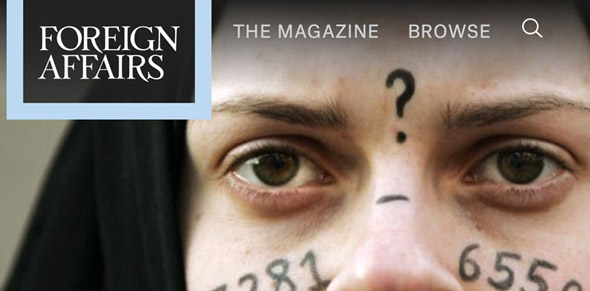
LINGUISTICS / ANTHROPOLOGY / URBAN PLANNING / MEDIA LAB
Rebuilding Haiti
Haiti’s past casts a long shadow over its future, according to four MIT scholars (all with strong personal ties to Haiti) who spoke at a Starr Forum held to explore the future of the country. Insights from Michel DeGraff, associate professor of linguistics, Erica James, associate professor of anthropology, Cherie Miot Abbanat, lecturer in the Department of Urban Studies and Planning, and Dale Joachim, a visiting scientist at the MIT Media Lab.
Learn about the keys to Haiti's future
INTERNATIONAL STUDIES
Ugandan journalist joins the Center for International Studies
Jackee Budesta Batanda — a Ugandan journalist who has reported on the vicious acid attacks of women as "revenge crimes" and the targeted murders of albinos — has been selected as the 2011-2012 Elizabeth Neuffer Fellow. The award is offered through the International Women's Media Foundation and is sponsored in part by the Center for International Studies at MIT.
Story at MIT News
ANTHROPOLOGY | MATCHING AID TO NEEDS
Getting aid right in Haiti | Erica Caple James
In her book Democratic Insecurities: Violence, Trauma, and Intervention, MIT anthropologist Erica James examines the psychological damage inflicted on the island nation’s inhabitants and makes recommendations to help better match aid to needs. “There is typically a disconnect between what people are experiencing on the ground and what is perceived at the administrative level,” James says. “There needs to be much more involvement by high-level decision-makers with people in local communities.”
Story at MIT News
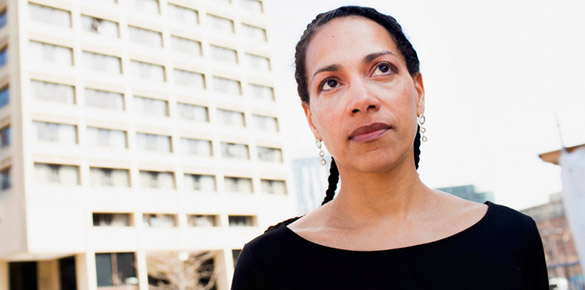
Erica Caple James, MIT Associate Professor of Medical Anthropology and Urban Studies, and Director, MIT Global Health and Medical Humanities Initiative
ECONOMICS
MIT economist Nancy Rose served in the Department of Justice in the Obama administration
MIT economist Nancy Rose, an expert on firm behavior and the economics of regulated industries, was named by the U.S. Department of Justice (DOJ) as deputy assistant attorney general for economic analysis during the Obama administration.
Story by SHASS Communications
INTERNATIONAL STUDIES | SOCIAL JUSTICE
Pakistani journalist Rabia Mehmood receives Neuffer Fellowship
"Rabia’s work in Pakistan demonstrates a dedicated and brave pursuit to expose social injustices. We look forward to her time at MIT and are honored to have her among us," said Richard Samuels, director of CIS and Ford International Professor of Political Science at MIT."
Story by SHASS Communications
GLOBAL STUDIES & LANGUAGES | ADOPTION AND IDENTITY
Bruno Perreau examines the politics of adoption in France
MIT Associate Professor of French Studies Bruno Perreau explores how adoption issues in France reveal deeply-held views about gender, parenthood, and "Frenchness."
Story by SHASS Communications

L to R: Michel DeGraff, Professor of Linguistics; Bruno Perreau, Associate Professor of Global Studies and Languages; Nancy Rose, Professor of Economics
ECONOMICS | INVESTING IN CITIZENS
Q&A | U.S. inequality issues among the “99 percent”
In an article in Science, MIT economist David Autor moves the U.S. inequality discussion beyond the 1% vs. 99% comparison. In the long run, he says, "the best policies we have to combat inequality involve investing in our citizenry. Higher education, and public education, is America’s best idea. Those investments also include preschool, good primary and secondary schools, and adequate nutrition and health care."
Story at MIT News
WRITING | TRANSFORMATION THROUGH LANGUAGE
The Power of Stories | Helen Elaine Lee
"Every few months for twelve years, I have visited a Massachusetts prison to teach creative writing to a group of locked-up men.... It is not my job to unravel the skein of their guilt, to judge or absolve. I am here as a witness. I am here in the name of story and its power to transform." — from "Visible Men"
Read Essay at the New York Times
DEVELOPMENT ECONOMICS
Life on a dollar a day
In Poor Economics, Abhijit Banerjee and Esther Duflo open a window into the lives of the world’s poorest people, and suggest new remedies to combat poverty. “You have to understand how the poor live,” says Esther Duflo, the Abdul Latif Jameel Professor of Poverty Alleviation and Development Economics. “But the way policymaking is done is usually miles away from that.” We should closely study the poor, then prescribe remedies that will actually appeal to those living on 99 cents per day, say Duflo and Banerjee.
Story | About the book: Poor Economics
POLITICAL SCIENCE | ACCESS TO VOTING
Voting Technology Project releases report: "Managing Polling Place Resources"
Just as the one-year count-down for the 2016 presidential election has begun, the Caltech/MIT Voting Technology Project (VTP) has released a new report — and a set of updated online tools — to help election officials better manage their polling place resources and provide a better experience for voters.
More

Charles Stewart, Kenan Sahin Distinguished Professor of Political Science; Helen Elaine Lee, Professor of Writing; Richard Nielson, Assistant Professor of Political Science
POLITICAL SCIENCE
Why sign rights treaties? | Richard Nielsen
“We couldn’t find any evidence that rewards come to states that ratify human rights treaties,” says Richard Nielsen, an assistant professor of political science, and a co-author of a new paper that scrutinizes the actions of countries occupying what he calls “the middle zone between pure democracy and nondemocracy.”
Story at MIT News
SCIENCE, TECHNOLOGY, AND SOCIETY
Conference asks 'what's the use of race?'
"Most social scientists agree that racial categories are arbitrary labels that we use to carve up human diversity into manageable chunks, and that race will always be much more of a social phenomena than a biological one," said David Jones, a former associate professor in the Program in Science, Technology and Society.
Story at MIT News
ECONOMICS | ECONOMIC EQUITY
Understanding the growing inequality in the U.S. | Christine Walley
"If you want to understand the expanding class inequality in the United States, one of the places you have to look is the long-term impact of deindustrialization. We have to think historically about how we got into this position and how we can come out of it.” In her book, Exit Zero, MIT anthropologist Christine Walley brings her anthropological perspective home, examining the human cost of deindustrialization in the American heartland.
Story + Video | About the Exit Zero Project | Trailer for Exit Zero video

What is the impact of deindustrialization in the U.S. — on American lives, families, and communities?
DEVELOPMENT ECONOMICS | POVERTY ACTION LAB
A “graduation” from poverty
An anti-poverty program tested extensively on three continents has produced sustained gains in individuals’ income, wealth, and well-being, according to a study published in the journal Science. The program provides very poor people with productive assets, such as livestock, as well as job training, life-skills coaching, and health information. Known as the “Graduation” program, its intention was to examine whether helping the poor in multiple ways simultaneously could be especially effective in fighting poverty.
Story on MIT News
ECONOMICS | POVERTY ALLEVIATION
A global community dedicated to alleviating poverty gathers at MIT
JPAL@10 event celebrates the 10th anniversary of the Abdul Latif Jameel Poverty Action Lab. “J-PAL fits in perfectly with MIT’s mission and values — to make the world a better place through service to humanity,” said MIT President L. Rafael Reif, who addressed the gathering. “Everyone here is concerned with questions of deep moral importance — and that is how to relieve human poverty and the suffering it creates.”
Story by SHASS Communicaitons
INTERNATIONAL STUDIES
Facing the global refugee crisis
At a recent MIT-sponsored event, scholars and relief workers from across the globe describe current refugee conditions as “the tip of the iceberg.” The panelists contended that wealthier countries could be doing more to accommodate the current influx of refugees — and overestimate the extent to which refugees will stay in their borders.
Story at MIT News
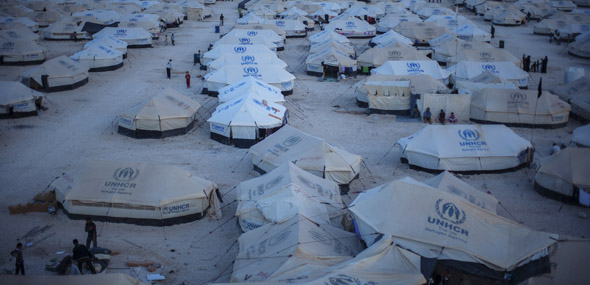
Za'atari refugee camp, Jordan (photocredit The UN Refugee Agency/Brian Sokol)
Suggested Links
Sampler of MIT Research on Work and Economic Equity
Collected stories
MIT | Institute Community and Equity Office
The ICEO mission is to advance a respectful and caring community that embraces diversity and empowers everyone to learn and do their best at MIT.
Website
LBGTQ at MIT
Website | History
MLK Programs at MIT
Visiting Scholars, Annual Events, Leadership Award, Videos, Design Seminar
Webpage to all programs
The Human Factor Series
Solving the political, cultural, and economic dimensions of global issues
Browse the Series
Abdul Latif Jameel Poverty Action Lab
Search the JPAP database of 679 randomized evaluations conducted by affiliates in 64 countries, and view the library of policy publications:
Data base | Library of policy publications
Book recommendation from the MIT Libraries
Celebrate Pride Month | LBGTQ 2016
The Radical King (Beacon Press, 2015)
MIT-SHASS Bookshelf
Faculty books, recordings, and publications
Sampler prepared by MIT SHASS Communications
